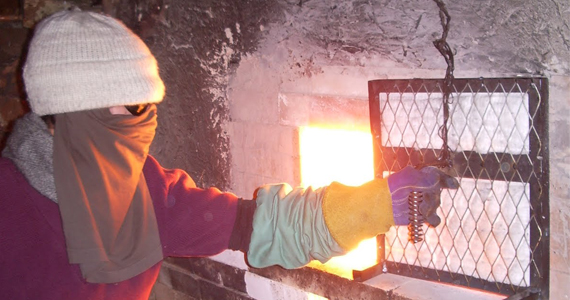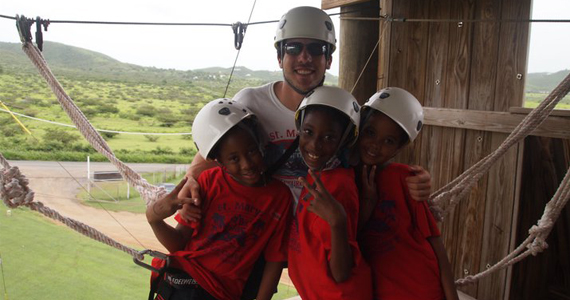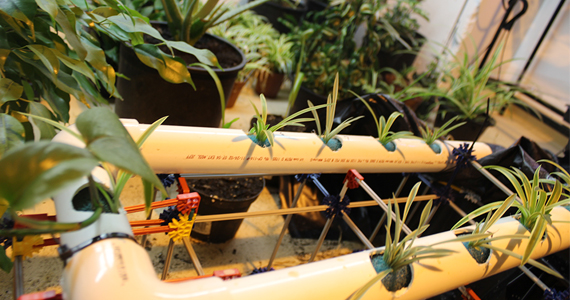Going Off the Grid With Biome Founder Collin Cavote
Collin Cavote traveled across the country to find his inspiration in the most unlikely of places. Now he’s on a mission to bring nature back to urban life. Do you believe?
April 10, 2015
by Joseph Master
In 2008, Collin Cavote sat on a beach in Washington State’s Lopez Island and watched crude oil tankers travel across the Pacific — en route to some far off refinery, with millions of gallons of oil in their hulls.
It was here, some 3,000 miles from his childhood home in Allentown, Pa., that Cavote first envisioned what would become Biome, a company he founded in 2014 at Drexel.
“I realized that all of these toxins were going to make it into the air, and as residents of this planet, we have to figure out how to keep our air as clean as it was before our existence,” Cavote says.
Months earlier, Cavote had gone off the grid. He’d dropped out of business school at Temple — and went West. There was no goal, only a spark. He knew he wanted to bring nature into urban life. He just didn’t know how. But he did know this: He wasn’t going to learn it in a classroom. He had to pull this answer out of thin air.
“I decided I was going to build a company that would add real value to the world, that would truly be sustainable, without harming the environment,” Cavote says.
So, Cavote decided to learn how to be sustainable on his own. He learned to rely on the good will of strangers — to take opportunities as they arose. Sometimes these opportunities arose in the oddest of places. First, there was living on a farm with a family of ‘Wild Crafters’ who harvested plants from their natural, wild habitat for both food and medicinal purposes.
“There is an assumption in sustainability that the idea of agriculture is inherently flawed,” Cavote says. “When we grow food in a set space we actually ruin the environment. So these people are beyond the idea of growing your own food. The idea is to walk into a forest … and make it work.”
Cavote also spent a five-month spell in the Arkansan Ozarks with a potter and his wood-fired kiln. His sole role was to feed the massive Japanese-styled anagama kiln, which needed to be fired for 10 day periods, with only firewood.
His travels took him to more common places. He worked in bars, lived on couches, developed friendships. He experienced the world as it was and as it should be.
In 2013 he came back to attend Drexel’s Pennoni Honors College as a Custom Design major. Since then, Cavote has devoted his life to building Biome, a company devoted to making nature accessible in urban environments. Currently, Biome is designing modular biowall systems (breathing walls) that are more than just art installations — they actually clean the air.
We sat down with Cavote to hear his thoughts on the environment, capitalism and what it means to be a Drexel dragon.
 Cavote fires an anagama, a type of ancient kiln, during a five-month stint living with a potter in the Arkansan Ozarks.
Cavote fires an anagama, a type of ancient kiln, during a five-month stint living with a potter in the Arkansan Ozarks.
So, are you a hermit? Do you need to get away from the big city?
I need my hermit time, definitely.
How does it feel to be the guy with a social venture in a city defined by tech?
I always kind of had this attitude of creating something different than what is around me.
In Philadelphia, I definitely feel a bit of an outlier. Do I wish there were more companies creating hardware to solve more problems? Yes. I think apps are great, but they’re not going to feed people or solve climate problems.
Silicon Valley is exhausted of photo apps. In 2013, there were 1000 photo apps that got $2 million a piece in venture capital. Guess how many companies got $2 million for solving diabetes or cancer? Not a thousand. So, VCs are salivating for solutions to real problems.
Make no mistake, while Biome is a social venture we are based on science and technology: there’s science behind the plant selection and feeding them. There’s technology behind the physical design and food delivery systems and software behind the system management and human interface. We employ engineers and scientists in our social venture.
Now that you have taken the headfirst plunge into the VC pool, what has struck you most about the culture? Has anything surprised you?
They realize that our species is in a nest of complex, interrelated problems. The beauty of solving these problems is that there is, inherently, profit to be made.
Let’s put it this way: Anyone who solves climate change is going to make a ton of money.
It is also very encouraging when you meet with other young entrepreneurs who are trying to solve problems, and not just fill a market gap to make profit.
 Cavote trains summer campers on the ins and outs of a high ropes course.
Cavote trains summer campers on the ins and outs of a high ropes course.
So, how do you justify trying to help save the world while making a buck?
It’s like nature. The only things that succeed are symbiotic. It’s partnerships and working together, that makes nature successful, and which will make the sustainability effort successful. Water is the lubricant of life, and capital is the lubricant of business, you need it to flow responsibly and appropriately.
Capitalism is a perfect idea, but is flawed by human nature. But beyond that, the idea of business competition is flawed. Darwin said organisms compete. But really, it’s about collaboration. I mean, nature, is all about layering organisms in relationships. And sometimes they have to compete, but more often they are working together. Business, for the last 150 years, has been expressing a very very narrow subset of relationships.
OK. So if we take on this philosophy, where is capitalism going?
We must be concerned about what Capitalism is, or isn’t, accomplishing. Capitalism inspires people to work hard, but its inherently flawed because it accumulates power and resources. What I like about VCs right now, at least the people I’m talking to, is that they see their cash not just as something to horde, but as a resource to keep reinvesting in ideas that will deeply improve humanity.
Do you remember the first time you actually grew something?
My parents have been a big inspiration for me. I remember when I was 5 or 6 we grew watermelon in our backyard. To see this succulent watermelon come out of this pile of dirt was an epiphany to me! What else in the world … takes only rain and sunshine to becomes something delicious?
The point is that nature inherently creates value and is self regulating. Which kind of goes against capitalism because humans want create value so they can continue to profit from it. Much of the ‘modern world’ has forgotten that nature does all of this stuff for us, and has already solved many of our current problems, we just need to listen.
What is Biome? Is it a biowall company? Or is it something much larger?
Biome, at its core, is a company devoted to developing technology to harness nature’s genius – bringing our civilization back to its roots without sacrificing our progress. We are starting with air quality, but our engineer, Sean, is already looking into how to water and soil technologies. Biome will be a suite of brands and products, that help solve diverse environmental problems.
So, it’s not just a biowall thing. It’s a nature thing…
Right. As I have mentioned before, nature has already solved many of our problems, we just need to use our modern technology to harness and optimize natural technology. And we’re doing it first with biowalls.
 A Biome prototype.
A Biome prototype.
What is the best advice you ever received?
So, I lived with a mentor for two years. I managed the house for a chemical company executive In Allentown, Pennsylvania. I managed his property. He was instrumental in me coming back to college and helping me to believe in myself, that I could come back to the world and create something.
Around 2011, he told me to love myself, to be my best advocate, and I really needed to hear that.
He also encouraged me to write letters to myself from the future. I’m 60 years old and I’m writing to my younger self about all I have done. What that allowed me to do was to put a destination point way out in the future that I want to start building toward. So, each year, I write a letter to myself from the future. It’s been extremely helpful.
What advice do you have for like-minded, socially conscious entrepreneurs who might feel a bit disenfranchised by the very same capitalism in which you see so much opportunity?
What I say — especially to young people who say they don’t want to work for a big corporation, or that all companies are bad – is that if we don’t work our way into them and try to improve them, then they are going to stay the same unevolving organisms they are. There are many ways in which to induce change, being an entrepreneur is just one.
So, love it or leave it?
Ha. More like, embrace it, understand it, and improve it. Don’t scapegoating it. There are so many people who just whine about the way the world is. Embrace it. Improve it. Negativity hinders progress.
How do you feel about your time at Drexel?
Drexel and the custom major program has allowed me change all the rules of the game for higher education. I didn’t want to be told what to learn. I had a very clear idea of what I needed to learn and what I wanted to do. Often, when you are put into these silos, that’s when you become tormented and unsure of what you want to do. For having to put your dreams into a box; that’s the antithesis of what we should be inspiring kids to do.
Drexel has given me no walls. And it’s been successful for me.